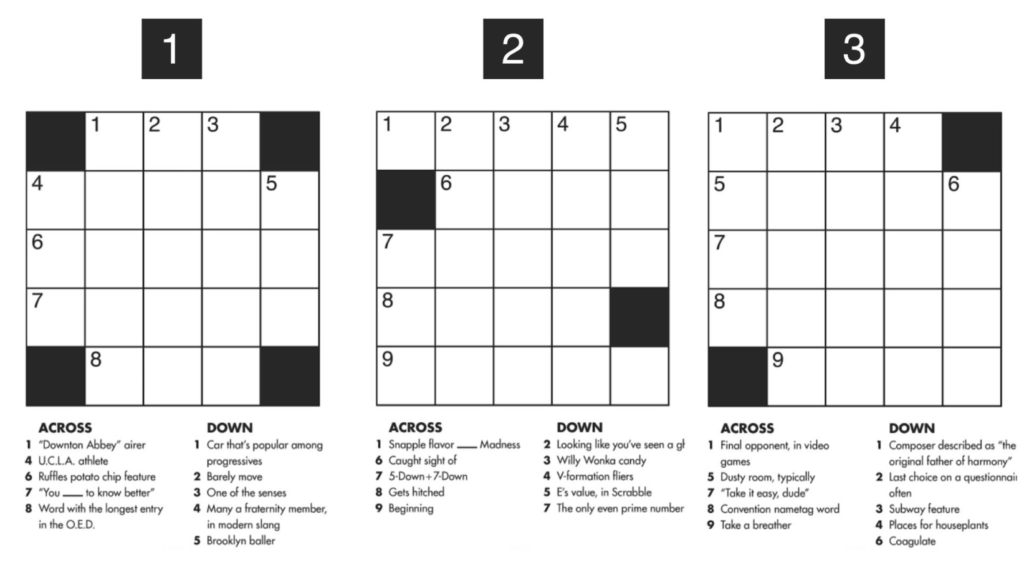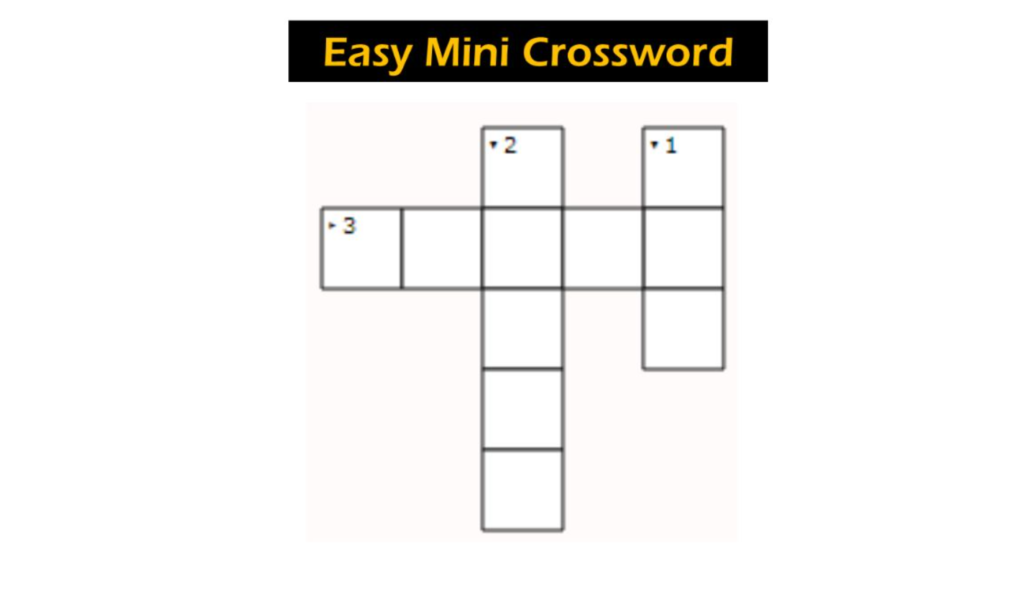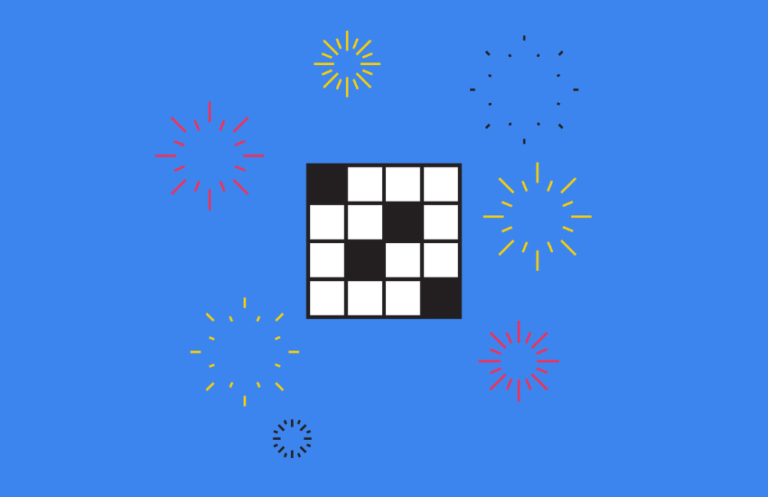For those who love the mental stimulation of word puzzles but don’t always have the time to sit down with a full-sized crossword, the mini crossword offers the perfect alternative. These bite-sized puzzles, often available online or through daily publications, pack the same enjoyment and brain workout into a smaller, more manageable format. While solving a mini crossword may seem easier than tackling a full crossword grid, these puzzles often come with their own unique challenges.
In this article, we’ll dive into the world of mini crosswords, exploring the history of these compact puzzles, what makes them popular, and some essential tips and tricks to help you master them. Whether you’re a crossword beginner or a seasoned solver looking for a quick daily challenge, mini crosswords can provide the perfect dose of fun and mental exercise.
Mini Crossword Profile
| Puzzle Type | Mini Crossword |
|---|---|
| Typical Grid Size | 5×5 (sometimes 4×4 or 6×6) |
| Average Completion Time | 1-5 minutes |
| Common Platforms | The New York Times, USA Today, The Guardian, Puzzle apps |
| Difficulty Level | Beginner to Intermediate |
| Purpose | Quick mental challenge and vocabulary building |
| Popular Variations | Timed mini crosswords, themed mini crosswords |
What Is a Mini Crossword?
A mini crossword is a smaller version of a traditional crossword puzzle, usually featuring a grid size of 5×5 squares, though variations like 4×4 or 6×6 grids also exist. Unlike full-sized crosswords, which can have anywhere from 15×15 to 21×21 grids, mini crosswords are designed to be solved quickly. This compact format is especially appealing for people who want a brief yet stimulating break during their day without the commitment that a full-sized puzzle requires.

The clues in mini crosswords are generally more straightforward than those in larger puzzles, making them accessible to both beginners and experienced crossword solvers. However, due to the limited grid size, the puzzle constructors must choose their words carefully, resulting in compact, clever clues and answers that often require creative thinking.
Mini crosswords have become particularly popular in digital formats, with apps and newspapers like The New York Times, USA Today, and The Guardian offering daily mini crossword puzzles. These daily challenges encourage players to build a consistent habit of puzzle-solving, enhancing vocabulary and cognitive skills along the way.
Why Are Mini Crosswords So Popular?
The popularity of mini crosswords can be attributed to several factors, including their accessibility, convenience, and the satisfaction they offer. Here are a few reasons why mini crosswords have captured the attention of puzzle lovers worldwide:

- Quick Completion: A mini crossword can often be completed in just a few minutes, making it ideal for people with busy schedules. Whether you’re on a coffee break, waiting for a meeting, or commuting, mini crosswords provide a quick mental boost.
- Daily Challenges: Many platforms offer a daily mini crossword, which builds a sense of routine and accomplishment. Completing a puzzle every day can be rewarding, creating a mini achievement to look forward to each morning.
- Easy Accessibility: Mini crosswords are widely available on mobile apps and online, making it easy to access them anytime, anywhere. This digital accessibility allows users to play on their smartphones or tablets, whether at home or on the go.
- Improved Vocabulary: Solving mini crosswords helps build vocabulary and improve spelling skills, making them a fun yet educational activity. The concise format encourages players to learn new words and synonyms, which can be useful in everyday life.
- Perfect for All Levels: Mini crosswords offer challenges without being overwhelming, making them suitable for beginners and seasoned solvers alike. They provide just enough complexity to engage the mind without the frustration that can sometimes accompany full-sized crosswords.
Tips for Solving Mini Crosswords
While mini crosswords may be shorter than traditional ones, they can still be challenging, especially if you’re new to puzzle-solving. Here are some tips to help you master mini crosswords and improve your solving skills:
1. Start with the Short Words
Short words, especially three-letter words, are common in mini crosswords due to the limited grid space. Starting with these smaller words can help you fill in parts of the grid quickly, giving you hints for the longer answers. Pay attention to common short words like “run,” “see,” “bat,” and “air,” as they often appear in mini crosswords.

2. Look for Clues with Definite Answers
Some clues have straightforward answers that don’t require too much thinking. For example, clues related to numbers (“Two plus two”) or familiar abbreviations (“Mr. or Mrs.”) often have predictable answers. Spotting and solving these clues first can help you get a foothold in the puzzle.
3. Use the Crosses
In crossword puzzles, answers are often interdependent. If you’re unsure about a particular word, look at the words that intersect with it, known as “crosses.” Sometimes, filling in the words that cross with the one you’re stuck on can give you the letters you need to figure it out.
4. Think About Wordplay and Puns
Many mini crossword clues use wordplay or puns to make you think outside the box. If a clue seems confusing or ambiguous, consider alternative meanings or homophones. Constructors love using clever word tricks, so if a clue doesn’t make sense at first glance, try interpreting it in a new way.
5. Keep Practicing
Like any skill, solving mini crosswords becomes easier with practice. The more puzzles you solve, the more familiar you’ll become with common crossword vocabulary and clue patterns. Over time, you’ll start recognizing clues and word structures, making it easier to solve puzzles quickly.
Common Themes and Types of Mini Crossword Clues
While mini crosswords are shorter, they still encompass a variety of themes and clue types that make them interesting and dynamic. Understanding some common themes and clue types can give you an edge when solving these puzzles.

- Pop Culture References: Mini crosswords often include references to well-known celebrities, movies, or songs. These clues can be fun and usually involve familiar names, like “Beyoncé” or “Star Wars.” Staying up-to-date with pop culture can help you solve these clues quickly.
- Abbreviations and Acronyms: Due to limited space, abbreviations are frequently used in mini crosswords. Clues might hint at common acronyms or abbreviations, such as “ATM” (Automated Teller Machine) or “NBA” (National Basketball Association).
- Fill-in-the-Blank Clues: These are some of the easiest types of clues and can give you a quick entry point into the puzzle. Examples might include “___ Street” (for “Sesame”) or “___ and behold” (for “Lo”).
- Directional Clues: Mini crosswords often use simple directional clues, like “North, South, East, West,” or references to locations. Examples include “Capital of France” or “NYC’s State.”
- Synonyms: Many clues rely on synonyms or alternative meanings. For instance, a clue like “large” might have answers like “big” or “huge.” These clues test your vocabulary and ability to think of alternative words with similar meanings.
Benefits of Solving Mini Crosswords
While mini crosswords are primarily a source of entertainment, they also offer several cognitive benefits. Here are some ways mini crosswords contribute to mental well-being and personal growth:
- Enhanced Memory: Solving puzzles regularly can improve memory and recall. The process of matching clues to answers and remembering common words or patterns reinforces memory pathways in the brain.
- Improved Vocabulary: Crosswords expose you to new words and phrases, expanding your vocabulary and understanding of language. As you continue solving mini crosswords, you’ll encounter different types of vocabulary that can be useful in day-to-day life.
- Stress Relief: Engaging in a focused activity like solving a mini crossword can be a form of mindfulness, helping reduce stress. Concentrating on a puzzle allows you to take a break from daily worries, promoting relaxation and focus.
- Quick Mental Workout: Mini crosswords provide a quick but effective cognitive exercise. Even spending just a few minutes on a puzzle can help sharpen your mind and improve mental agility, making it a great activity for a coffee break or commute.
- Boosted Confidence: Completing a mini crossword provides a small sense of accomplishment, boosting confidence and giving a positive start to your day. The satisfaction of solving even a single puzzle can have a cumulative impact on self-esteem.
Where to Find Daily Mini Crosswords
If you’re interested in adding a daily mini crossword challenge to your routine, there are several popular platforms to explore:
- The New York Times: The New York Times offers a daily mini crossword, which has become a favorite for many fans. It’s accessible through the NYT app or website and provides a new challenge every day.
- USA Today: USA Today features its own version of a daily mini crossword, which is typically easy to moderate in difficulty, making it accessible for most solvers.
- The Guardian: The Guardian’s online platform includes a selection of mini puzzles alongside their full-size crosswords, available for free.
- Crossword Apps: Many mobile apps provide daily mini crosswords, often with additional puzzles that cater to different themes, levels, and timed challenges. Apps like “Mini Crossword Daily” and “Redstone Mini Crossword” offer a large library of mini crosswords to enjoy anytime.
Conclusion: Start Your Mini Crossword Journey Today
Mini crosswords offer the perfect blend of challenge, convenience, and mental engagement. Whether you’re a beginner looking to dip your toes into the world of crosswords or a seasoned puzzler looking for a daily brain exercise, mini crosswords provide a rewarding experience. With quick completion times, daily availability, and cognitive benefits, they’re a fantastic way to sharpen your mind and expand your vocabulary without a significant time commitment.
So why not add a mini crossword to your daily routine? With resources like The New York Times, USA Today, and countless crossword apps, you can easily get started and make puzzle-solving a fun and productive habit. Happy puzzling!
